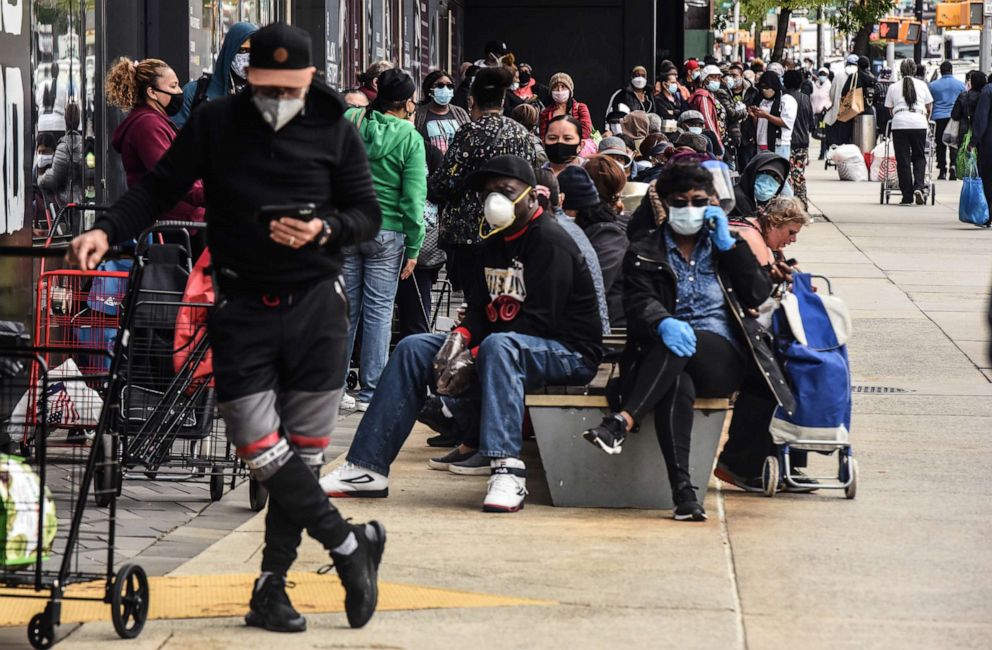Many New Yorkers who suspected they had COVID-19 did not, study finds
"You can't assume you had it... because you didn't feel well a few months ago."
“I think I had it.” You’ve likely heard someone say it, or perhaps you’ve been muttering it yourself.
It seems these months of quarantine-life and a growing list of COVID-19 symptoms are leading many to think back to that stubborn cold from back in February or that sudden stomach bug that hit in March and wonder if it really was the coronavirus.
Call it “I-think-I-had-it-itis."
But a hospital study in New York City has found that out of hundreds of New Yorkers who thought they potentially had COVID-19 in the last three months but never received a confirmed clinical diagnosis, only 37% tested positive for COVID-19 antibodies, a sign the body was previously likely infected and fought the virus.
“That does imply that likely many of the people who suspect that they had this probably didn't have it,” said Dr. Ania Wajnberg, one of the authors of the Mount Sinai study and an associate professor of medicine at the Icahn School of Medicine. “You can't assume that you had it just because you didn't feel well a few months ago.”

In comparison, 99% of New Yorkers tested by Mount Sinai who had a confirmed COVID-19 diagnosis did have antibodies, the cornerstone of the body’s immune response to a virus, the researchers reported.
Dr. John Brownstein, an epidemiologist at Boston Children's Hospital and an ABC News contributor, said he, too, had a bit of "I-think-I-had-it-itis."
"As someone who actually was convinced that they had been infected and then tested negative, it’s clear that many of us have been in the same boat," he said. "What we need to remember is that COVID-19 was circulating at the same time as a number of respiratory viruses likely creating confusion on the origin of infection."
Brownstein said the new data suggests that the U.S. could be "a ways off [from] herd immunity and further demonstrates the need of testing capacity."
The findings were among the first to come out of Mount Sinai’s monumental antibody testing program, which is now performing over 3,000 tests a day, tallying over 25,000 people so far. The study, which was published earlier this month and has not been peer-reviewed, looked at the initial 1,343 people tested in the program, including those who had previously confirmed coronavirus infections and those who suspected, or were told by their doctors, that they likely did but were not tested.
The broader aim of the antibody program is to identify donors for convalescent plasma, an experimental treatment sometimes used for seriously ill hospitalized COVID-19 patients.
“We've given convalescent plasma to hundreds of patients at the Mount Sinai health system, and that's been a good thing to be part of,” Wajnberg said. “And it's also helping us learn about potential immunity.”
Researchers at Mount Sinai were among the first in the U.S. to develop an antibody test and received emergency use authorization (EUA) from the Food and Drug Administration in April. There are currently 13 such tests with EUA in the U.S.
This week, Mount Sinai announced it is beginning to commercially produce its antibody test with a goal of testing more than 10 million patients per month by July.
Antibody tests are distinct from what are called diagnostic coronavirus tests, which look for live virus currently infecting the body. The Mount Sinai study said the results suggest "the optimal time frame for widespread antibody testing is at least three to four weeks after symptom onset and at least two weeks after symptom resolution."
Antibody tests not only allow doctors to understand who has antibodies, but can also help reveal how strongly a person responded to the virus. And, depending on the kind of antibody found, these tests can signal whether or not a person may have some immune protection to future infection.
The kind of antibodies that experts are hoping to find are called neutralizing antibodies – those that have the power to squash the coronavirus. But because the current coronavirus circulating is new, scientists can’t yet say with certainty that having antibodies means someone is immune to re-infection.
“We are hopeful that like most respiratory viruses, the presence of antibodies in your system is going to be protective for some time,” Wajnberg added. “However, since we haven't had a lot of time to actually monitor this and do the testing that we've done for other viruses, we don't know for sure yet. So there's still work that needs to be done before people with antibodies can sort of run back into the world and assume that they're going to be fine.”
What to know about coronavirus:
- How it started and how to protect yourself: Coronavirus explained
- What to do if you have symptoms: Coronavirus symptoms
- Tracking the spread in the U.S. and worldwide: Coronavirus map




